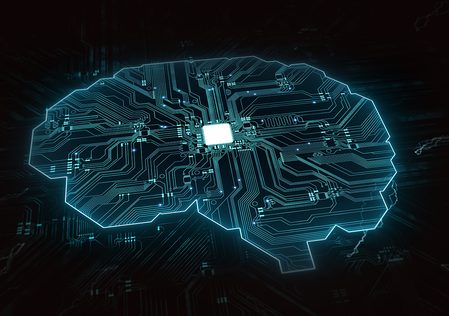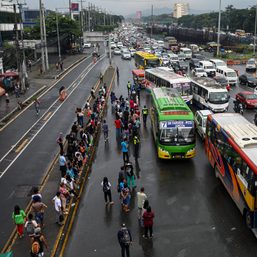SUMMARY
This is AI generated summarization, which may have errors. For context, always refer to the full article.

Generative artificial intelligence (AI) is taking the world by storm. So much so that the emerging tech tool is already and expected to continue steering the course of many industries and workforces.
In the Philippines, in particular, the impact of generative AI will be most felt in tech sectors such as the business process outsourcing (BPO) industry, where it’ll prove to be a transformative force worth up to P30 billion in the next two to four years, as online learning platform Coursera believes.
This is why the US-based firm, founded in 2012 by Stanford University computer science professors Andrew Ng and Daphne Koller, says reskilling and upskilling will be vital in an AI-led economy.
The platform offers courses, certifications, and degrees in a wide range of subjects.
We were able to have a quick Q&A with Coursera’s Asia-Pacific and India managing director, Raghav Gupta, where we asked him how disruptive generative AI can be for industries in the Philippines, and how it’ll affect the local business and education landscape.
Below, he shares his insights on those, as well as the opportunities and challenges that the tech brings, and the firm’s own plans in the coming age of AI.
Q: How do you see the future of the Philippines’ business landscape as the country begins to embrace AI technology?
Raghav Gupta (RG): Like most economies, The Philippines is also at the cusp of a major transformation with AI integration, significantly impacting sectors such as science, healthcare, education, and the crucial IT-BPM sector, which employs over 1.3 million workers.
The rise in automation, accelerated by the pandemic, has already led to a rapid digitization of work processes. Generative AI further intensifies this trend, and has the potential to unlock substantial economic value for the Philippines, estimated at $79.3 billion.
However, this demands a digitally skilled workforce, emphasizing continuous learning and upskilling, especially for roles like engineers, data scientists, and business professionals.
To navigate these changes, the Philippine government has developed the National Artificial Intelligence Strategy. This strategy aims to maximize AI’s benefits across industries, addressing the country’s unique challenges and ensuring businesses and workers are equipped to leverage AI’s potential while managing its risks.
Ultimately, the integration of AI in the Philippines represents a dynamic shift in the economic and workforce landscape, bringing opportunities for innovation, increased productivity, and global competitiveness. It calls for strategic planning and adaptation, both in the private sector and through government initiatives, to harness the full potential of AI while navigating its challenges.
Q: Coursera believes that reskilling and upskilling is vital for a workforce to thrive in an AI-led economy. Can you explain this? How does reskilling and upskilling help the workforce?
RG: Digital transformation and emerging technologies like generative AI are rapidly changing the way we work, and their influence extends to a broad range of knowledge workers. For example, warehouse workers may need to learn how to use digital tools for inventory tracking, sales teams must understand data analysis for better forecasting and strategic decision making, and IT support staff may need to learn new systems and software applications.
Many Coursera for Business customers are investing in upskilling their employees to improve their digital and data skills, enabling them to keep up with new tools and practices.
While tech skills like data analysis and software development are in-demand among employers and employees, we also see an enduring need for human skills like communication, problem solving, computer literacy and management.
As AI accelerates and puts more jobs at risk, leadership will become increasingly important. Leaders are the ones who help employees navigate and even thrive during change. It’s a uniquely human skill – and one that AI will likely never replace.
Our Job Skills of 2023 Report, which draws insights from millions of learners on Coursera, identifies that the fastest-growing skills are digital skills in areas such as scrum software [software used for work and team collaboration] development, customer success tools, CRM [customer relationship management] software, and user experience design.
The study also found that skills that combine technical expertise with project management have surged over the last year, and the demand for human skills, such as management and communication, has remained steady over time, emphasizing their evergreen need.
Q: Reskilling and upskilling, of course, involves education. How does Coursera see the future of the Philippines’ education landscape as adoption of AI grows?
RG: Generative AI is set to evolve the learning experience dramatically, and help us deliver on the promise of personalized and interactive learning at scale – something that traditional higher education has yet to be able to do well.
It has the potential to level the playing field for students, especially ESL (English as a second language) learners, who can use it as a powerful writing assistant and thought partner.
Q: Is the use of AI in education limited to online learning platforms like Coursera or can they also help education in the public sector, for example?
RG: The technology will reshape many aspects of how we design and deliver education today. Content will be generated at a rate and cost like never before, but it’ll make expert knowledge even more valuable.
We’re now piloting Coursera Course Builder – a tool that utilizes generative AI to auto-generate course content, including structure, descriptions, assignments, and relevant materials, based on simple prompts from a human author.
This democratization of content production will allow universities to focus more on providing enriching campus experiences. The learning experience will evolve from passive video watching to active engagement with AI-powered chatbots, offering personalized, 24/7 assistance – something we’re aiming for with Coursera Coach.
In terms of assessments, the focus will shift from simply explaining learned concepts to applying them, with an emphasis on hands-on assessments, group projects and measuring soft skills like teamwork, empathy, critical thinking, growth mindset, and initiative.
However, students and faculty must understand how to use generative AI ethically and effectively. We recommend universities set clear expectations with students and implement policies that detail when and where AI tools can be used.
Students should also attribute any work generated by AI tools. If ethically and effectively used, AI promises to significantly improve learning experiences, opening economic opportunities for students worldwide.
Q: Knowing this now, how does Coursera plan to empower the country’s workforce with the skills they need to thrive in an AI-driven future?
RG: We collaborate with industry experts and top-ranked universities to ensure that our course catalog meets the learner and labor market needs.
Earlier this month, we launched a new beginner-friendly course, “Generative AI for Everyone,” taught by global AI leader, Andrew Ng, that helps individuals, including non-technical backgrounds, learn how generative AI works and its impact on work and daily life.
To date, we have 825-plus AI-related courses on the platform from global experts, and many focussed on GenAI like Prompt Engineering for ChatGPT from Vanderbilt University, Generative AI with Large Language Models from DeepLearning.AI, and AWS and Introduction to Generative AI from Google Cloud.
In the Philippines, we have over two million learners, and work with many companies, universities and government entities as Ayala Corporation, Globe Telecom, Bank of the Philippine Islands, Ayala Land, Mapua University, Lyceum of the Philippines University, and Department of Science and Technology to help them develop the skills and talent base to harness the power of generative AI as the need for digital transformation becomes even more urgent.
AI is also a central part of the solution to make learning even more effective. The technology has enabled us to develop training content at higher quality and lower cost, reduce language barriers using machine translation, and enhance the learning experience by making it more personalized and interactive. – Rappler.com
Add a comment
How does this make you feel?


![[Vantage Point] Senate feud shields doubtful costs of new building](https://www.rappler.com/tachyon/2024/07/tl-Senate-feud-shields-cost-senate-building-July-10-2024.jpg?resize=257%2C257&crop=282px%2C0px%2C720px%2C720px)

![[OPINYON] Thesis for sale](https://www.rappler.com/tachyon/2024/06/tl-thesis-for-sale-1.jpg?resize=257%2C257&crop_strategy=attention)
![[The Slingshot] Blunders and mess Sara left behind at DepEd](https://www.rappler.com/tachyon/2024/06/TL-Sara-Duterte-DepEd-June-24-2024.jpg?resize=257%2C257&crop_strategy=attention)



![[New School] Regrets and redemption: Notes of a pandemic-time, graduating college senior](https://www.rappler.com/tachyon/2023/05/regrets-redemptions-notes-may-28-2023.jpg?resize=257%2C257&crop=448px%2C0px%2C1080px%2C1080px)
There are no comments yet. Add your comment to start the conversation.